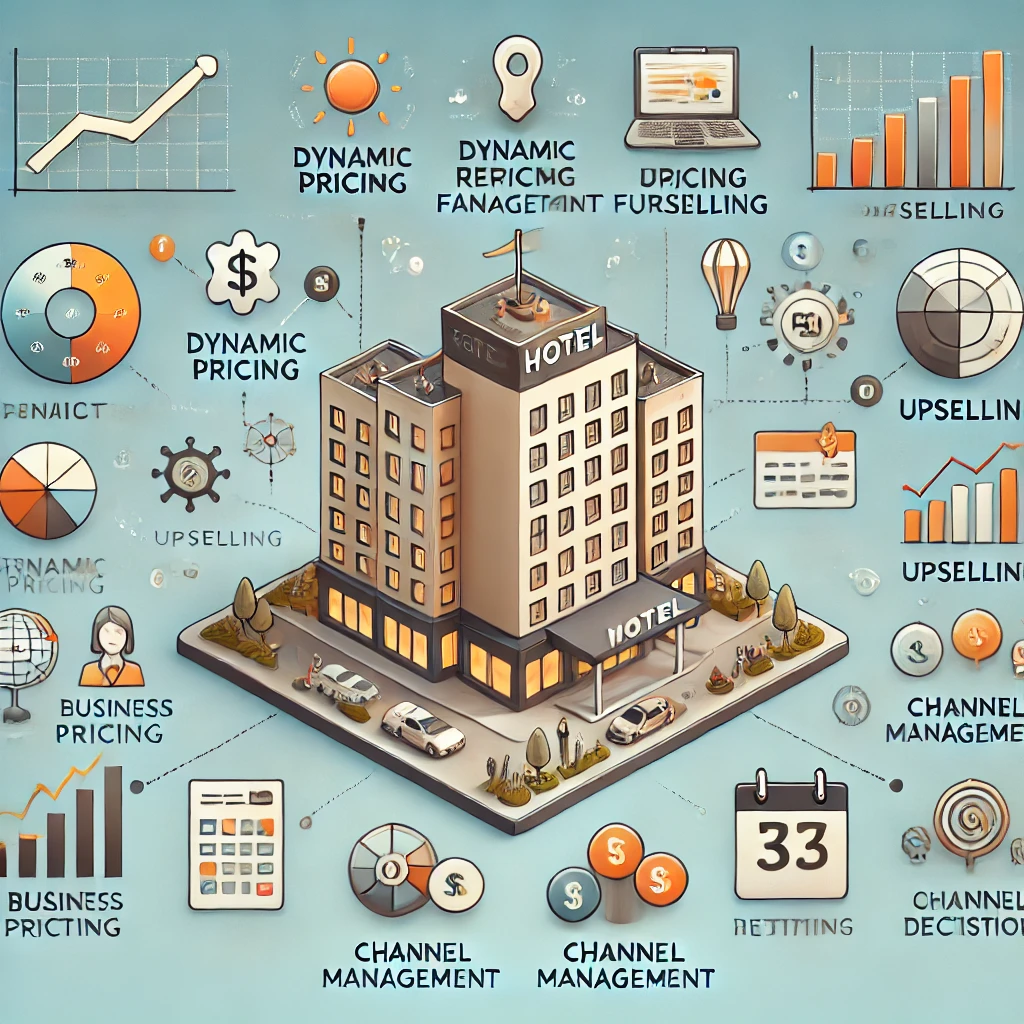Revenue Management Strategies for Hotels:
Maximizing Profitability with Jniksus Hospitality Services
In the ever-evolving hospitality industry, effective revenue management plays a crucial role in ensuring a hotel’s profitability and long-term success. Moreover, by implementing smart pricing strategies, analyzing market trends, and leveraging technology, hotels can significantly boost their revenue. As a result, Jniksus Hospitality Services specializes in providing top-notch revenue management solutions specifically designed to help hotels optimize their pricing, enhance bookings, and increase overall profitability.

Understanding Revenue Management in Hospitality
Revenue management is the strategic use of data analysis, pricing strategies, and forecasting techniques to sell the right room to the right guest at the right time for the right price. By aligning room rates with demand fluctuations, hotels can maximize their revenue potential.
Jniksus Hospitality Services applies proven revenue management strategies to ensure their partner hotels stay competitive and profitable in the ever-changing market landscape.
Key Revenue Management Strategies for Hotels
1. Dynamic Pricing for Maximum Yield
1. Dynamic Pricing for Maximum Yield
Dynamic pricing involves adjusting room rates in real-time based on demand, occupancy levels, and market trends. Jniksus Hospitality Services uses advanced software and data analytics to automate pricing, ensuring optimal rates in peak periods and competitiveness in low seasons.
Example: rates increase during holidays to maximize revenue, while discounts are offered in off-peak periods to boost occupancy.
2. Forecasting and Demand Analysis
Accurate forecasting is essential to predict demand patterns. Jniksus leverages historical data, booking trends, and market conditions to forecast future demand accurately. This allows hotels to prepare for high-traffic periods and implement effective pricing strategies in advance.
Key Metrics Monitored:
- Occupancy rates
- Average Daily Rate (ADR)
- Revenue Per Available Room (RevPAR)
3. Segmentation and Targeting
Segments May Include:
- Business travelers
- Leisure tourists
- Group bookings
- Last-minute travelers
4. Optimal Distribution Channel Management
Effective management of booking platforms and OTAs is crucial for maximizing reach. Jniksus ensures partner hotels are listed on major OTAs like Booking.com, Expedia, and Travebabu, while also optimizing direct booking strategies to reduce commission costs.
Key Practices Include:
- Prioritizing high-performing channels
- Negotiating favorable commission rates
- Monitoring channel performance for continuous improvement
5. Length of Stay (LOS) Strategies
Jniksus recommends implementing LOS strategies to optimize occupancy and maximize revenue. Implementing stay restrictions during peak periods helps hotels secure longer bookings and reduce reservation gaps.
Example: Hotels may require a 2-night minimum stay during festivals or conferences to maintain steady occupancy
6. Upselling and Cross-Selling Techniques
Enhancing the guest experience while increasing revenue is possible through strategic upselling and cross-selling. Jniksus trains hotel staff to promote upgrades, dining packages, spa services, and local experiences, encouraging guests to spend more during their stay.
7. Rate Parity and Pricing Integrity
Maintaining consistent pricing across all booking channels builds trust and prevents customer confusion. Jniksus ensures partner hotels maintain rate parity by constantly monitoring and adjusting prices across all distribution platforms.
8. Promotional Campaigns and Special Offers
Jniksus designs targeted promotional campaigns to attract bookings during low-demand periods. These may include early bird discounts, last-minute deals, or value-added packages that appeal to travelers seeking budget-friendly options.
9. Technology Integration for Enhanced Efficiency
Jniksus uses advanced tools to streamline hotel operations and automate revenue management.
10. Data-Driven Decision Making
Revenue management thrives on accurate data. Jniksus employs cutting-edge analytics tools to gather insights from occupancy patterns, competitor pricing, and guest behavior, enabling hotels to make informed decisions that drive revenue growth.
The Jniksus Advantage: Why Choose Us?
Jniksus Hospitality Services stands out in the hospitality industry with its holistic approach to revenue management. By combining technology, expert analysis, and strategic planning, Jniksus empowers hotels to achieve their revenue goals.
Key Benefits of Partnering with Jniksus:
– Customized revenue management strategies for different property types
– Dedicated revenue management experts offering ongoing support
– Integration of cutting-edge technology for optimal pricing automation
– Proven track record of enhancing hotel profitability
People Also Ask:
Hotel revenue management courses
Hotel revenue management companies
Conclusion
Effective revenue management is the backbone of a successful hotel business. With Jniksus Hospitality Services’ expertise, hotels can unlock their full revenue potential, maximize bookings, and achieve sustainable growth. By leveraging dynamic pricing, advanced forecasting, and strategic marketing, Jniksus ensures partner hotels thrive in today’s competitive landscape.
Not all guests have the same preferences or spending habits. Jniksus helps hotels segment their audience based on factors such as demographics, booking behavior, and purpose of travel. By offering tailored packages and promotions, hotels can attract different customer segments more effectively.
For hotels seeking to boost their revenue and stay ahead in the market, Jniksus Hospitality Services offers the perfect solution. Contact us today to elevate your hotel’s profitability with our tailored revenue management strategies.
Proudly powered by Jniksus


